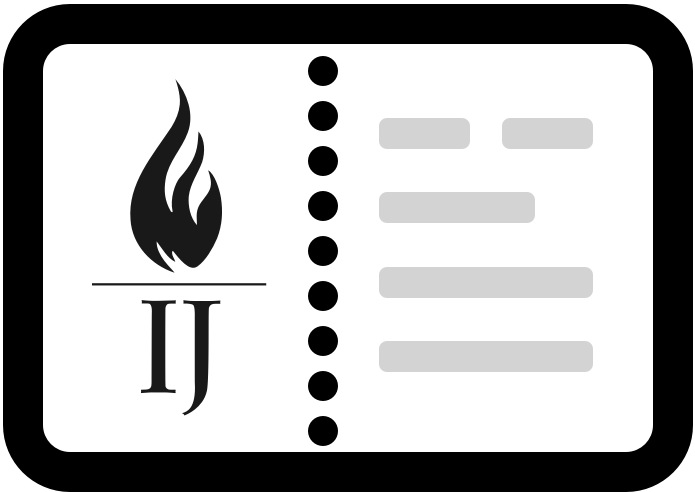New Hampshire licenses 38 of the 102 lower-income occupations studied here—fewer than average—and its laws rank as the 34th most burdensome. On average, New Hampshire’s barriers to entry to lower-income occupations are $183 in fees, 273 days of education and experience, and roughly two exams. New Hampshire ranks as the 41st most broadly and onerously licensed, placing it among the nation’s less burdened states.
New Hampshire licenses several occupations that are rarely licensed elsewhere, such as animal trainers (licensed by eight other states), sign language interpreters (21 others), opticians (21 others) and auctioneers (29 others). Among those, sign language interpreters face particularly steep burdens in New Hampshire: $875 in fees, about 1,469 days (four years and 40 hours) of education and two exams.
New Hampshire also makes it much more difficult to enter many occupations—such as barbering or cosmetology—than it does to become an EMT, an occupation that arguably has a stronger connection to public safety. Barbers must complete 800 hours (an estimated 187 days) of education, while cosmetologists must complete 1,500 hours (an estimated 350 days). EMTs, on the other hand, need only complete 150 hours (an estimated 35 days) of education. In 2017, New Hampshire exempted hair braiders from the state’s cosmetology laws. It could expand opportunities by reducing or repealing its heavy licensing burdens for other lower-income occupations, or—if government regulation is demonstrably necessary—by replacing them with less restrictive alternatives.
New Jersey licenses 54 of the 102 lower-income occupations studied here. Its laws rank as the 16th most burdensome and require, on average, $224 in fees, 422 days of education and experience, and around one exam. New Jersey ranks as the 28th most broadly and onerously licensed state.
New Jersey licenses several occupations rarely licensed elsewhere. For example, few other states license animal control officers (six), locksmiths (13), taxi drivers and chauffeurs (15), or crane operators (17). Among those, locksmiths and crane operators are particularly onerously licensed. Locksmiths face unusually high education and experience requirements—roughly 732 days, comprising two years of experience and 10 hours of education. By comparison, the average across licensed states is just 54 days lost to education and experience. And crane operators pay fees that are more than double the average across licensed states: $475 versus $225.
New Jersey also imposes burdens on some occupations that seem excessive compared to those for other occupations that may present greater risks to the public. For example, its education and experience requirements for barbers and cosmetologists are much higher than those for EMTs. Barbers must study for 900 hours (roughly 210 days) and cosmetologists for 1,200 hours (roughly 280 days), while EMTs need only 110 hours of education and 10 hours of experience (roughly 27 days total). New Jersey could improve job prospects for its lower-income residents by lifting or easing its heavy licensing burdens for barbers, cosmetologists and other occupations, or—if government regulation is necessary—by replacing them with less restrictive regulatory alternatives such as inspections or voluntary certification.
New Mexico’s licensing laws for lower-income occupations are some of the most arduous in the nation, ranking as the ninth most burdensome. The laws require, on average, $266 in fees, 520 days of education and experience, and about two exams. New Mexico also licenses more lower-income occupations than average—66 of the 102 studied here—making it the 11th most broadly and onerously licensed state.
New Mexico frequently licenses occupations that are unlicensed by other states, such as sign language interpreters (licensed by 21 other states), crane operators (17 others), bartenders (12 others), packers (five others), non-instructional teacher assistants (four others) and dietetic technicians (just one other). Dietetic technicians also face particularly steep burdens in New Mexico, where they must pay $180 in fees, sacrifice 835 days—more than two years—to education and experience, and pass an exam. Dietetic technicians operate nearly everywhere else without needing state licensure, calling into question whether New Mexico should license them at all—let alone so onerously.
New Mexico also imposes burdens on some occupations that seem excessive compared to those for other occupations that may present greater risks to the public. For example, the requirements to run a bill collection agency in New Mexico are $800 in fees, two years (730 days) of experience and one exam. Meanwhile, the requirements to become an EMT are $218 in fees, 180 hours (roughly 42 days) of education and two exams. It should not require 17 times more education and experience to run a bill collection agency than it does to become an emergency first responder. New Mexico could broaden employment opportunities in the state by reducing or repealing its illogical licensing requirements for bill collection agencies and other occupations, or—if government regulation is necessary—by replacing licenses with less restrictive regulatory alternatives.
New York licenses 41 of the 102 lower-income occupations studied here, which is fewer than most other states. Its laws are the 32nd most burdensome, requiring an average of $279 in fees, 275 days of education and experience, and around two exams. New York ranks as the 37th most broadly and onerously licensed state.
Despite licensing fewer occupations than average, New York licenses some occupations that are rarely licensed elsewhere. For example, few other states license animal trainers (eight), upholsterers (nine), farm labor contractors (nine) or crane operators (17). Not only are crane operators unlicensed by most states, but they also face particularly heavy burdens in New York. Aspiring crane operators in the Empire State must demonstrate three years (1,095 days) of experience before they can work. But the average education and experience required of crane operators across licensed states is only 222 days of education and experience—just one fifth of the time required by New York. New York also requires much higher fees for some occupations than other states. While the national average fees for pesticide applicator licenses are $260, New York charges $3,000 for its vegetation pesticide applicator license and $2,200 for its pest control applicator one.
New York also imposes burdens on some occupations that seem excessive compared to those for other occupations that may present greater risks to the public. For example, its education requirements for veterinary technicians are considerably higher than those for EMTs, who provide emergency first aid to humans. Aspiring EMTs study for about a month (118 hours or an estimated 28 days), while would-be vet techs need 26 times more education—two years (730 days)—to become licensed. New York should evaluate whether such onerous licensing requirements can be reduced, repealed or—if government regulation is necessary—replaced with less restrictive regulatory alternatives.
North Carolina’s licensing laws for lower-income occupations are the 41st most burdensome in the nation. They require, on average, $199 in fees, 234 days of education and experience, and around one exam. Because North Carolina licenses more of the lower-income occupations studied here than most other states—67 of 102—it ranks as the nation’s 17th most broadly and onerously licensed state.
North Carolina licenses several occupations that are unlicensed elsewhere, such as opticians and sign language interpreters, who are both licensed by just 21 other states. Despite infrequent licensure in other states, both occupations are fairly onerously licensed in North Carolina. Opticians must demonstrate about 912 days of education and experience (comprising two years of education and six months of experience) before becoming licensed—much more than the average of 714 days across licensed states. And sign language interpreters face $938 in fees and 1,469 days (four years and 40 hours) of education in North Carolina—considerably higher than the licensed-state averages of $661 in fees and 1,088 days of education and experience.
North Carolina also licenses some occupations much more onerously than it does others that may have a stronger connection to public safety. For example, North Carolina has one of the most burdensome barbering licenses in the nation, requiring $270 in fees, 722 days lost to education and experience (comprising 1,528 hours of schooling and one year of experience), and three exams. But EMTs need just 43 days (166 hours of education and 24 hours of experience) and two exams to become licensed. North Carolina should consider whether its heavy licensing burdens for barbers and other occupations can be reduced, repealed or—if government regulation is necessary—replaced with less restrictive regulatory alternatives such as inspections or voluntary certification.
Nebraska’s licensing laws for lower-income occupations are the least burdensome in the nation. They require, on average, $76 in fees, 118 days of education and experience, and roughly one exam. However, because Nebraska licenses more lower-income occupations than average—63 of the 102 studied here—it is the 27th most broadly and onerously licensed state.
Nebraska licenses several occupations that are rarely licensed elsewhere, and it does so fairly onerously. For example, many states do not license title examiners (44) or bill collection agencies (20). Yet Nebraska title examiners face $825 in fees and one year of experience, compared to licensed-state averages of $355 and 104 days. And Nebraskans wishing to open a bill collection agency must demonstrate two years (730 days) of experience, compared to a licensed-state average of 159 days. Given that many states do not license these occupations at all, it is irrational that Nebraska licenses them so onerously.
Nebraska also imposes education requirements on some occupations that seem excessive compared to those for other occupations that may present greater risks to the public. For example, barbers and cosmetologists need 2,100 hours (approximately 490 days) of education, while EMTs need only 138 hours (approximately 32 days). In 2017, a bill was introduced that, among other things, would have pared back Nebraska’s requirements for barbers, cosmetologists and other occupations. The bill failed, but Nebraska should try again and consider whether such licenses can be repealed altogether or—if government regulation is demonstrably necessary—replaced with less restrictive alternatives such as inspections or voluntary certification.
Arkansas is one of the worst states in the nation when it comes to licensing lower-income occupations. It licenses 72 of the 102 occupations studied here, and its licensing laws rank as the sixth most burdensome, due to high average education and experience burdens. On average, Arkansas requires $246 in fees, 642 days of education and experience, and about one exam. Because it licenses so many occupations so onerously, the state ranks as the third most broadly and onerously licensed.
Arkansas licenses several occupations that are rarely licensed elsewhere. For example, nursery workers are licensed by just one other state, psychiatric technicians by four and title examiners by six. Among these, title examiners face particularly steep burdens. They need at least one year of experience to become licensed in Arkansas, which is more than three times the average required in other licensed states (about 104 days).
The most onerously licensed occupation in Arkansas is fire alarm installer. Licensees must have 1,825 days—five years—of experience, pay $1,443 in fees and pass four exams before they can open for business. By comparison, the average across licensed states is about half that: $557 in fees, 915 days lost to education and experience, and two exams. To open up more employment opportunities in the state, Arkansas should reduce, if not repeal, these and other particularly onerous licensing burdens, or—if government regulation is necessary—replace them with less restrictive regulatory alternatives.
Maryland’s licensing laws for lower-income occupations are the 11th most burdensome. On average, Maryland’s barriers to entry into these occupations are $288 in fees, 529 days lost to education and experience, and about one exam. Because it licenses slightly fewer occupations than similarly burdensome states—59 of the 102 studied here—Maryland ranks as the nation’s 20th most broadly and onerously licensed state.
Maryland licenses several occupations that are rarely licensed elsewhere. For example, few other states license packers (five), tree trimmers (six), animal trainers (eight), upholsterers (nine) or farm labor contractors (nine). Among those, tree trimmers face particularly steep burdens. To obtain a license, they must demonstrate two years of education and one year of experience (1,095 days total), pass an exam, and pay a $30 fee. With so few states licensing tree trimmers, it is questionable for Maryland to license them at all, let alone so onerously.
Maryland also imposes high education and experience requirements on some occupations that seem excessive compared to those for other occupations that may present greater risks to the public. For example, EMTs are deemed competent to work as first responders after only 165 hours (approximately 39 days) of education. Meanwhile, barbers must complete 1,200 hours (roughly 280 days) of education and cosmetologists 1,500 hours (roughly 350 days) before becoming licensed. To expand opportunity, Maryland should reduce, if not repeal, inconsistent or irrational burdens like these, or—if government regulation is necessary—replace them with less restrictive regulatory alternatives.
Massachusetts’ licensing laws for lower-income occupations are the 10th most burdensome, requiring, on average, $309 in fees, 513 days lost to education and experience, and roughly one exam. Massachusetts licenses fewer lower-income occupations than most states—50 of 102—making it the 29th most broadly and onerously licensed state.
Massachusetts licenses some occupations much more onerously than other states, including some that are already among the nation’s most burdened occupations. For example, both of the state’s commercial sheet metal contractor licenses—HVAC and other—require five years (1,825 days) of experience. But the average education and experience requirement across licensed states is 1,215 days for HVAC sheet metal contractors and just 567 days for other sheet metal contractors. These disparities are particularly jarring given that several states do not license these occupations at all.
Massachusetts also imposes burdens on some occupations that seem excessive compared to those for other occupations that may present greater risks to the public. Cosmetologists, for example, must complete 1,000 hours of education and then demonstrate two years of experience (the equivalent of 963 days)—the heaviest education and experience requirements of their type. But Massachusetts deems EMTs able to administer life-saving aid after having demonstrated only 150 hours (about 35 days) of education. To expand opportunity for lower-income workers, Massachusetts should repeal or reduce irrationally heavy licensing burdens, or—if government regulation is necessary—replace them with less restrictive regulatory alternatives.
Michigan licenses 49 of the 102 lower-income occupations studied here, which is fewer than the national average. Its laws are the 33rd most burdensome. On average, Michigan’s barriers to entry into lower-income occupations are $242 in fees, 255 days lost to education and experience, and approximately two exams. It ranks as the 30th most broadly and onerously licensed state.
Michigan licenses some occupations that are not licensed by other states. For example, 15 states do not license veterinary technicians at all, but to work in Michigan they must pay $350 in fees, complete two years (730 days) of education and pass an exam. Similarly, many states do not license animal control officers (44), taxi drivers and chauffeurs (35), or residential painting contractors (23), among other occupations. Michigan also imposes more onerous requirements than many other states for some occupations. Fire alarm installers, for example, must pay $1,045 in fees before becoming licensed. That is nearly twice the $557 average across states that license the occupation.
Michigan also imposes burdens on some occupations that seem excessive compared to those for other occupations that may present greater risks to the public. For example, people wishing to start a bill collection agency must demonstrate six months (roughly 182 days) of experience to receive a license. Meanwhile, EMTs must complete only 194 hours (about 45 days) of education. Not only is it illogical to require four times as much training for bill collection agencies as for emergency first responders, but 20 states do not license bill collection agencies at all. Michigan can expand employment opportunities in the state by reducing or repealing irrationally burdensome licensing requirements, or—if government regulation is necessary—by replacing licensing with less restrictive regulatory alternatives such as insurance, inspections or voluntary certification.








